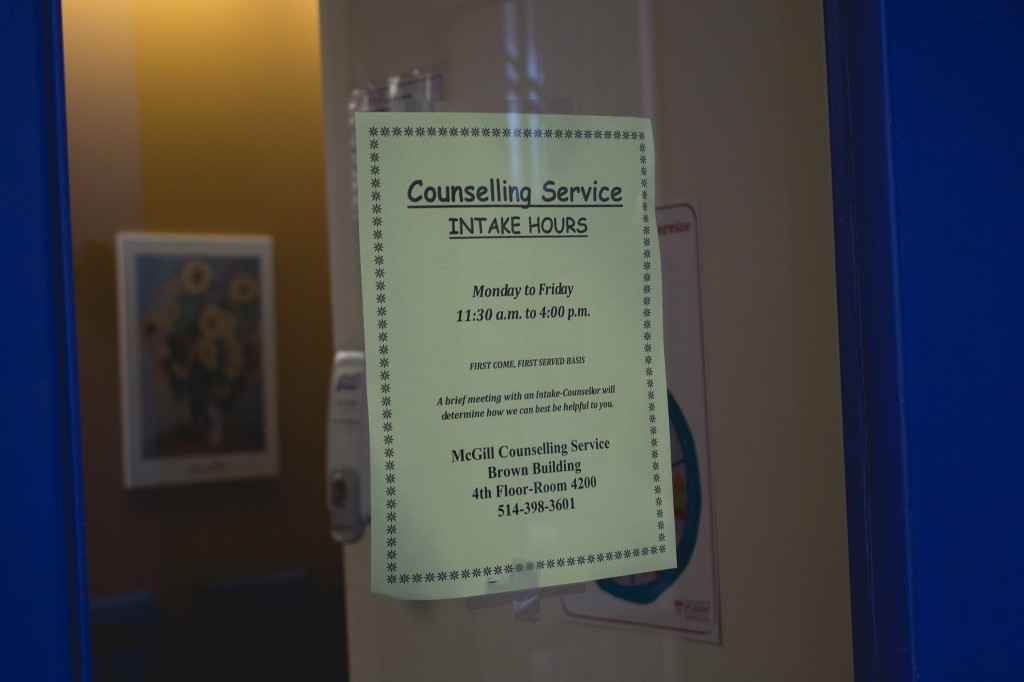 Mental Health Services (MHS) at McGill prides itself on providing comprehensive diagnosis and treatment for various “mental health difficulties,” including but not limited to anxiety, depression, obsessions or compulsions, ADHD, eating disorders, seasonal mood disorders, trauma-related anxiety, and substance abuse. Featuring drop-in urgent care, appointments with health professionals, counseling services, and peer support networks, MHS strives to “respond to student need in a flexible way,” according to Executive Director of Student Services Jana Luker.
Mental Health Services (MHS) at McGill prides itself on providing comprehensive diagnosis and treatment for various “mental health difficulties,” including but not limited to anxiety, depression, obsessions or compulsions, ADHD, eating disorders, seasonal mood disorders, trauma-related anxiety, and substance abuse. Featuring drop-in urgent care, appointments with health professionals, counseling services, and peer support networks, MHS strives to “respond to student need in a flexible way,” according to Executive Director of Student Services Jana Luker.
“The uptake for mental health services has increased [over the last five years],” Luker explained. “We’ve responded with a more diverse counseling base.”
However, with increased awareness, the current climate of mental health treatment at McGill has raised concerns — particularly questions of accessibility and efficiency. These critiques prompted McGill to conduct a study of 2,500 students in October 2013. The study identified several challenges the university community faces in mediating mental illness and outlined ambitious goals for promoting a more communicative and healthy campus, especially when it comes to promoting discussion about psychological well-being.
According to the study, 5 to 9 percent of McGill students reported utilizing psychological support services on campus, while another 3-5 percent sought help outside of McGill. These numbers are promisingly low. However, they do not necessarily indicate the number of students suffering from mental health issues. Many students may seek help but lack access or knowledge of the services available to them. There are also others, unfortunately, who suffer in silence
MHS as Triage
With a minimum waiting time of 2-3 weeks for a 1 hour appointment, MHS has limited resources for immediate, long-term, and preventive care. Length of prolonged conditions and lack of continuity in providers have been points of contention between the administration and the student body.
“MHS is a crisis center,” explained a U3 International Development student who wished to remain anonymous. “There’s no prevention work or help for students to grow out of their problems.” This student detailed from experience how waitlists could stretch far beyond 2-3 weeks. Delayed care “only aggravates problems,” the student added, and is a, “disservice to those who are proactive and seek early intervention.” This student sought outside services after a drop-in urgent care session in which the psychiatrist was “visibly overwhelmed” and “misplaced his frustrations” on the student.
“A 2 hour wait turns into eternity when you’re panicking […] and having anxiety attacks in the waiting room,” stated former McGill student and 2012 Loran Scholar, Alana Lapworth. Lapworth attended MHS drop-in urgent care twice and waited on average 2-3 hours each time for a brief 15 minute examination. Apart from the wait, she described the care she received on her two visits as “two complete extremes.” She detailed how one provider was accusatory and pushed her to take medication while the other gave her, “thoughtful words of encouragement [to] end the semester strong.” Lapworth later withdrew from McGill.
Luker hopes that MHS can expand beyond crisis management counseling and address larger behavior patterns. “Life is complex,” she explained, “and students are looking for solutions to more complex problems.” MHS has “responded with additional clinicians and more diverse modalities.” These new methods include use of technology for diagnosing and coping with crippling conditions. The university now offers an online self-assessment tools which can be accessed through the McGill Counseling Services website. However, this new initiative has been criticized by those who feel online diagnosis further isolates those who are suffering.
To assist students during exam periods and other times of peak demand, Luker outlined a proposed sustainable solution in which MHS would outsource care to Montreal hospitals and clinics for students who feel comfortable. This initiative continues Student Services’ efforts to respond to student needs in a flexible way. Their ultimate goal is to “support student success and wellbeing,” says Luker.
The Pressure of McGill Academics
The onset of mental illness in adolescents and young adults most often occurs before the age of 24. This is a period when genetic predispositions to a variety of disorders can have an impact on behavior and overall health. For many individuals, university can be a fragile time of personal and intellectual growth that is only compounded by the added stressor of mental illness.
Deputy Provost Ollivier Dyens believes mental illness is, “acute at McGill,” and often correlates directly to the demand students place on themselves to perform well academically. Because of the likelihood of mental illness to manifest during university years, it is often hard to distinguish if anxiety, for example, is a product of academic stress or indicates a stronger underlying condition. This ambiguity has some students worried.
The anonymous U3 student has observed a deeper-rooted “misconception [on campus] that all mental health problems stem from academic stress.” These issues could be pre-existing or lifelong conditions. “Mental health – as a field – is broader than that.”
Indeed, some students perceive a bias in the disseminated literature on campus. For example, most of the posters in Student Services address primarily academic topics such as dealing with exam stress or “coping with perfectionism,” instead of promoting a more balanced view of prevalent issues such recognizing the signs and symptoms of depression, severe anxiety disorder, or substance abuse. All of these are valid health concerns that can be aggravated or triggered by academic stress, but not necessarily caused by it.
Prevention and Self-Awareness
The 2013 study drew attention to the need to provide more effective preventive care. Dyens explained how his position has increasingly focused on, “how to provide students the fundamental support [required] to prevent serious problems from arising.” Dyens stated that the administration’s “tactics have shifted to [target] better preparation of the student body before they come to McGill.”
By expanding McGill 101, an online website currently designed to provide information to first years, and employing more technology, Dyens aims to “lower the pressure in other aspects of campus life, through services, support systems, and residences,” so that students can focus on their studies without unnecessary burdens. This encompasses McGill’s long-term goal to improve campus culture and the social outlook on mental illness and overall well being. “Our approach is to provide students with the tools to monitor their own progress” Dyens added.
In addition to understanding key signs and symptoms of mental illness, Luker suggests students “anticipate and plan” around peak times of academic stress. The first responders are the students themselves, who are encouraged to “become involved in various aspects of [campus] life,” as a preventative measure. Luker stressed that making positive personal changes should be a precursor to seeking professional help.
Offering Peer Support
MHS promotes use of peer support networks (PSN) as an alternative to counseling services. Groups such as Students in Mind provide a one-on-one confidential drop in service for students. Built on the basis of “active listening,” PSN volunteers, students extensively trained on how to navigate campus-related resources, provide a “pair of open ears to students who can’t access services,” according to PSN Chair Phil Leger. “Seeing a professional may be intimidating,” explained Leger. “PSN serves as an accessible option” into the MHS system. Services such as PSN reflect growing on-campus support for more wholistic, less formal forms of support.
Other organizations on the island of Montreal provide additional options for seeking psychological or psychiatric help. One example, Head and Hands offers a “harm-reduction, holistic” approach to treating mental illness.
Peer Support Networks: Tuesday, Wednesday, Thursday, 5-7 PM in the Brown Student Services Building Room 2100
Mental Health Awareness Week extends now until November 16.








